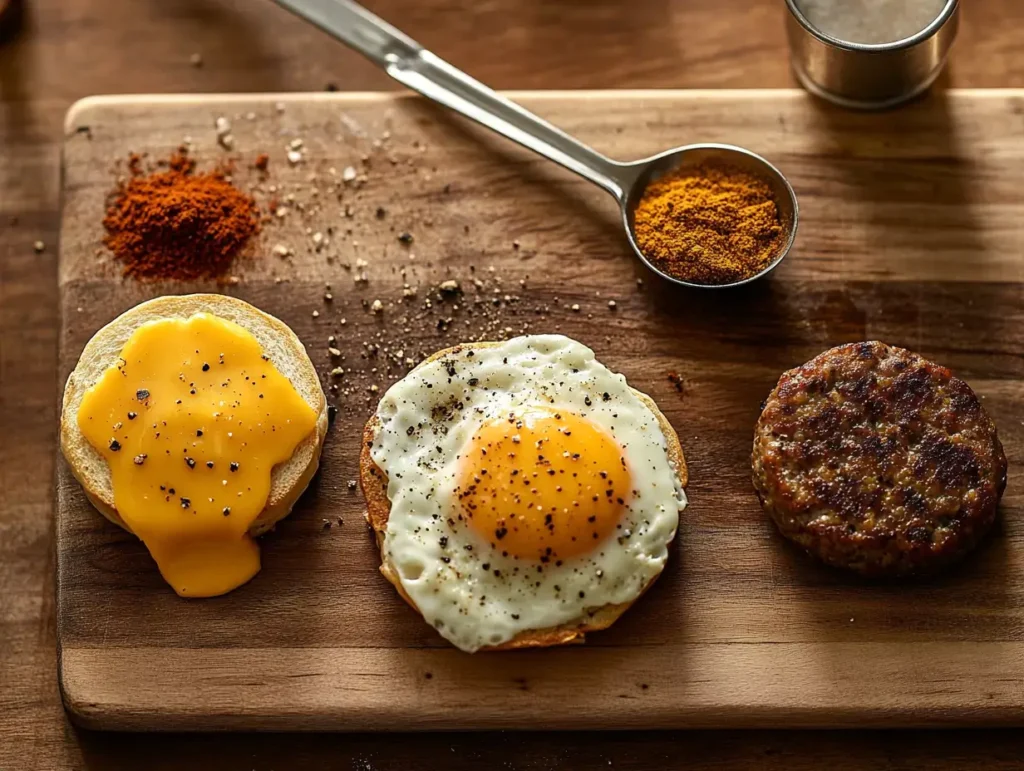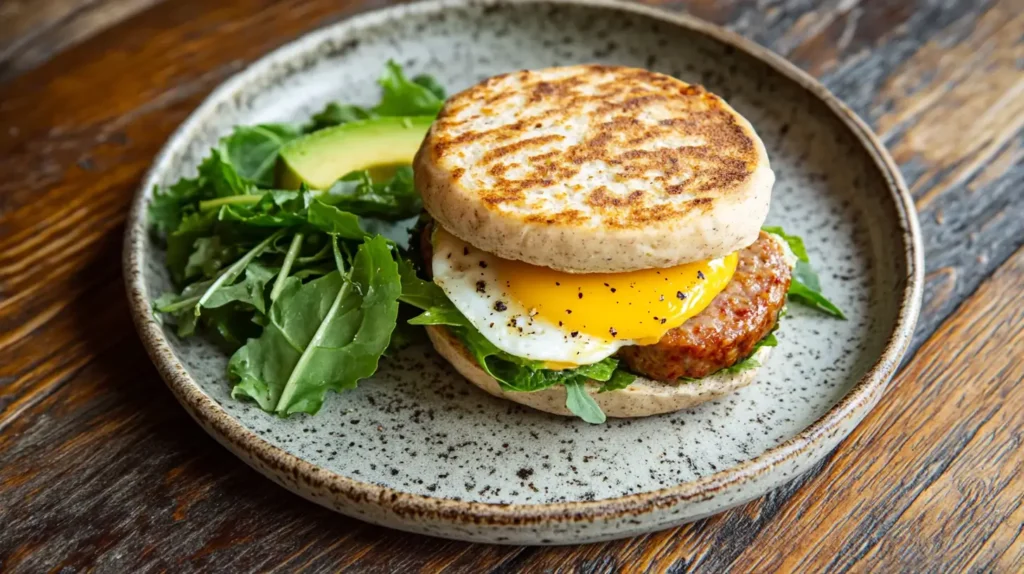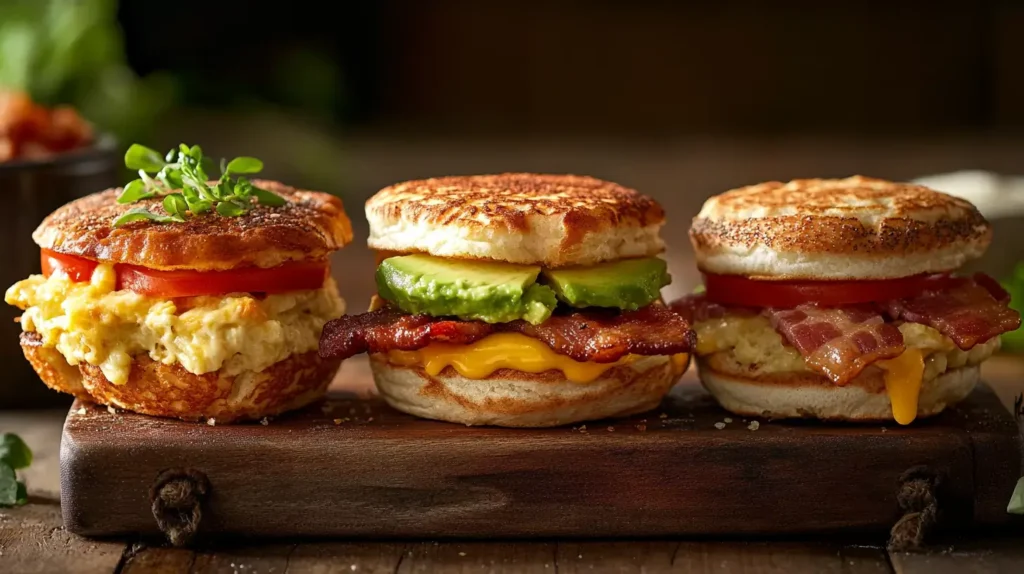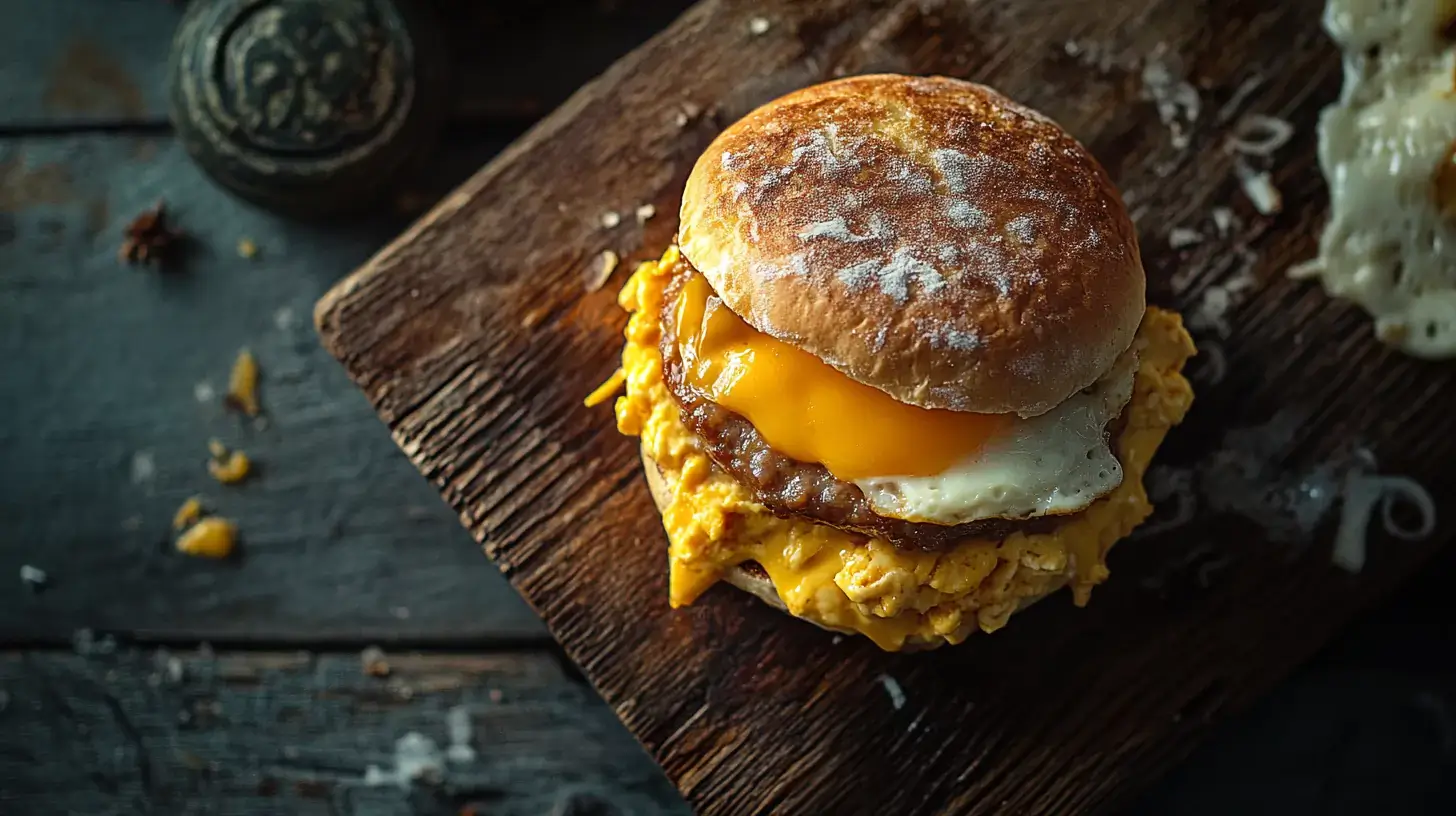How Many Calories Are in a Sausage Egg and Cheese McMuffin?
Introduction
How Many Calories Are in a Sausage Egg and Cheese McMuffin? The Sausage Egg and Cheese McMuffin is a breakfast favorite, loved for its delicious combination of savory sausage, fluffy egg, melted cheese, and a toasted English muffin. If you’re curious about its calorie count, understanding its nutritional value can help you make more informed choices. Whether you’re enjoying one from McDonald’s or making a healthier version at home, this guide will cover everything you need to know.
But for those mindful of their calorie intake, knowing how many calories are in this iconic sandwich is essential. Understanding its nutritional value can help you make informed decisions about when and how to enjoy it, whether you’re eating out or preparing it at home. In this guide, we’ll break down its calorie content, compare it to other breakfast options, and explore how to create healthier versions.
Table of Contents
Calorie Breakdown of a Sausage Egg and Cheese McMuffin

How Many Calories Are in a Fast-Food Sausage Egg and Cheese McMuffin?
A standard Sausage Egg and Cheese McMuffin from popular fast-food chains contains approximately:
- Calories: 450–480 kcal
- Protein: 20–25 grams
- Carbohydrates: 30 grams
- Fat: 30 grams
These values can vary depending on the chain and any regional ingredient changes.
Ingredients and Their Caloric Contributions in a Sausage Egg and Cheese McMuffin
Here’s a breakdown of the components in a typical McMuffin and their approximate calories:
- English Muffin: ~150 calories
- Sausage Patty: ~200 calories
- Egg: ~70 calories
- Cheese Slice: ~80 calories
The combination creates a hearty and balanced breakfast, but additional condiments or toppings can increase the calorie count.
Hidden Calories in Cooking Methods
- Butter for Toasting: Adding butter to the muffin can increase the calorie total by 50–100 calories.
- Cooking Oil: Frying the sausage in oil instead of grilling adds unnecessary calories.
- Cheese Placement: Melting cheese onto a hot sausage patty ensures better distribution and reduces the temptation to use more cheese.
Understanding the Nutritional Value of a Sausage Egg and Cheese McMuffin
Protein Content in a Sausage Egg and Cheese McMuffin
The Sausage Egg and Cheese McMuffin is a protein-rich breakfast option, offering approximately 20–25 grams of protein per serving. The sausage patty and egg are the primary protein sources, making it a good choice for those looking to start their day with a filling and energizing meal.
Carbohydrates and Fiber
The English muffin contributes most of the 30 grams of carbohydrates in a McMuffin, but it typically contains little fiber (around 1–2 grams). Opting for a whole-grain English muffin can increase fiber content, promoting better digestion and satiety.
Fat and Saturated Fat Levels in a Sausage Egg and Cheese McMuffin
The sandwich contains around 30 grams of fat, with 10–12 grams of saturated fat.
- Sausage Patty: Accounts for the majority of the fat due to its high pork content.
- Cheese: Adds saturated fat but also contributes creaminess.
While fats are necessary for energy, too much saturated fat can raise cholesterol levels, so it’s essential to balance it with lighter meals throughout the day.
Sodium and Cholesterol Content
- Sodium: A typical McMuffin contains approximately 800–900 mg of sodium, which is significant. Consider a homemade version to reduce this amount by choosing low-sodium sausage or cheese.
- Cholesterol: With ~200 mg of cholesterol per sandwich, mainly from the egg and sausage, it’s best to consume this occasionally if managing cholesterol levels is a concern.
Factors That Influence Sausage Egg and Cheese McMuffin Calories
Portion Sizes Across Brands
The calorie count of a Sausage Egg and Cheese McMuffin can vary based on the portion size of the ingredients:
- Sausage Patties: Fast-food chains may use larger, fattier patties to enhance flavor, which adds more calories.
- English Muffins: Artisan or gourmet muffins are often denser and heavier, increasing the overall calorie count compared to standard ones.
- Cheese Slices: Thicker cheese slices or adding an extra slice can add an additional 70–80 calories.
Ingredient Variations and Add-Ons
Customization often leads to higher calorie counts, depending on the additions:
- Extra Toppings: Adding bacon, avocado, or another egg layer can increase the calorie content by 50–150 calories per item.
- Sauces: Spreads like mayonnaise or aioli add flavor but can contribute an additional 100 calories.
- Butter for Toasting: Buttering the English muffin before toasting can add 50–100 calories depending on the amount used.
Cooking Techniques That Add or Reduce Calories
How the sandwich is prepared makes a difference:
- Frying vs. Grilling: Frying sausage patties in oil or butter adds extra fat and calories compared to grilling or baking.
- Toasting Methods: Using a toaster or dry skillet to toast the muffin eliminates calories from butter or oil.
- Egg Preparation: Cooking eggs with non-stick spray instead of butter significantly reduces fat content.
Comparing Sausage Egg and Cheese McMuffin to Other Breakfasts
How It Stacks Up Against Fast-Food Breakfast Sandwiches
The Sausage Egg and Cheese McMuffin offers a balanced mix of protein, carbs, and fats compared to other fast-food options:
- Bacon, Egg, and Cheese Croissant: Typically 500–600 calories due to the buttery croissant, with higher fat content but less protein.
- Breakfast Burrito: Ranges from 400–700 calories, depending on fillings like cheese, sausage, and potatoes, often containing more carbs.
- Double Sausage Biscuit: Frequently exceeds 600 calories with high fat and sodium levels, making the McMuffin a lighter alternative.
Is It Healthier Than Pancakes or Waffles?
The McMuffin is generally a better option nutritionally:
- Pancakes with Syrup: A stack of three pancakes with butter and syrup can reach 600–800 calories with minimal protein and fiber.
- Waffles: A standard waffle with toppings can also exceed 600 calories and lacks the protein content of a McMuffin.
What About Burritos or Croissants?
- Breakfast Burritos: While burritos can include similar ingredients, the tortilla adds extra carbs, and fillings like hash browns or heavy cheese can increase calories.
- Croissants: The buttery, flaky nature of croissants means they are higher in fat and calories compared to the more modest English muffin base of a McMuffin.
The Homemade Advantage: Lower Calories, Higher Control
Making your McMuffin at home offers the benefit of customizing ingredients to control calories and improve nutrition:
- Homemade McMuffin: Typically 300–400 calories, depending on the swaps used.
- Better Ingredient Choices: Use lean sausage, whole-grain muffins, and egg whites for a healthier option.
- Reduced Sodium: Choose low-sodium sausage or cheese to lower the sodium content significantly.
For a detailed guide, check out our Sausage Egg and Cheese McMuffin Recipe, where you’ll learn how to make a healthier version at home.
How to Make a Lower-Calorie Sausage Egg and Cheese McMuffin

Healthy Ingredient Swaps
Transforming your Sausage Egg and Cheese McMuffin into a lower-calorie meal is all about smart substitutions:
- Lean Sausage: Replace pork sausage with turkey sausage or plant-based patties. These options are lower in fat and calories but still flavorful.
- Whole-Grain Muffins: Swap traditional English muffins for whole-grain or low-carb versions to add fiber and reduce empty carbs.
- Egg Whites: Use egg whites instead of whole eggs to cut cholesterol and calories while keeping the protein.
- Low-Fat Cheese: Opt for reduced-fat cheese or plant-based slices to maintain creaminess with fewer calories.
Reducing Fat Without Losing Flavor
You can still enjoy a rich-tasting McMuffin by tweaking how it’s prepared:
- Grill the Sausage: Avoid frying and cook the sausage on a grill or in the oven to drain excess fat.
- Toast Without Butter: Skip the butter for toasting or use a light non-stick spray.
- Steam Eggs: Add a splash of water to the skillet and cover while cooking the egg to avoid using butter or oil.
Creative Additions for Nutrition and Taste
Add ingredients that enhance the nutritional value of your McMuffin without significantly increasing calories:
- Veggies: Layer in spinach, tomato slices, or sautéed mushrooms for extra vitamins and minerals.
- Healthy Fats: Add a thin spread of mashed avocado for a dose of heart-healthy fats.
- Flavor Boosters: Use herbs like parsley, chives, or smoked paprika to add flavor without additional calories.
Customizing Your Sausage Egg and Cheese McMuffin
Gourmet Toppings and Add-Ons
Elevate your Sausage Egg and Cheese McMuffin with these gourmet additions:
- Avocado Slices: Add creaminess and heart-healthy fats.
- Caramelized Onions: Sweeten the flavor profile with sautéed onions.
- Gourmet Cheese: Swap American cheese for options like Gruyère, Havarti, or Brie for a more luxurious taste.
- Spicy Boost: Add jalapeños, sriracha, or a chipotle mayo for a kick of heat.
Vegetarian and Vegan Options for Your Sausage Egg and Cheese McMuffin
Make your McMuffin plant-based or vegetarian with these ideas:
- Plant-Based Sausage: Use patties made from soy or pea protein.
- Vegan Cheese: Choose dairy-free cheese alternatives for a creamy texture.
- Egg Substitutes: Use tofu or a chickpea flour-based mixture to mimic the egg layer.
- Veggie-Packed Version: Replace the sausage with a thick slice of roasted portobello mushroom or grilled zucchini.
Ideas for a High-Protein Version
For those looking to increase protein intake, try these upgrades:
- Extra Egg Whites: Add one or two egg whites for additional protein without extra fat.
- Double the Sausage: Use two lean sausage patties for a meatier sandwich.
- High-Protein Muffins: Opt for protein-enriched English muffins to boost overall protein content.
Creating a Low-Carb or Keto-Friendly McMuffin
To make your McMuffin low-carb or keto-friendly:
- Skip the Muffin: Replace the English muffin with a lettuce wrap or portobello mushroom caps.
- Almond Flour Biscuits: Use keto-friendly almond flour muffins or biscuits as a base.
- Cheese Wraps: Replace the muffin with a baked cheese wrap for a low-carb option


How Many Calories Are in a Sausage Egg and Cheese McMuffin?
Ingredients
Method
- Heat a non-stick skillet over medium heat and cook the sausage patties until browned and fully cooked, about 3–4 minutes per side. Remove and set aside.
- Lightly grease the skillet with olive oil or non-stick spray.
- Crack the eggs into the skillet, season with salt and pepper, and cook to your desired doneness (sunny side up, over easy, or scrambled). For egg whites, pour into the skillet and cook until set.
- Toast the English muffins in a toaster or on a dry skillet until golden and crisp.
- Place a slice of cheese on the bottom half of each muffin. Top with a sausage patty and cooked egg.
- Add any optional toppings like spinach or avocado, then cap with the top half of the muffin.
- Serve warm with your favorite side, like fresh fruit or coffee.
Notes
- Storage Tips: Wrap the sandwiches in foil and refrigerate for up to 3 days. Reheat in a toaster oven or microwave before serving.
- Freezer Option: Assemble the sandwiches, wrap tightly, and freeze for up to 3 months. Thaw in the refrigerator overnight and reheat before eating.
- Healthier Swaps:
- Replace sausage with plant-based or turkey patties for a leaner option.
- Use egg whites instead of whole eggs to reduce cholesterol.
- Opt for a low-carb English muffin or lettuce wrap for a keto-friendly version.
- Fresh fruit salad for a refreshing side.
- Iced coffee or herbal tea to complement the flavors.
- Yogurt parfait with granola for a protein-packed addition.
Frequently Asked Questions
Is McDonald’s Egg McMuffin Healthy?
The Egg McMuffin is considered one of McDonald’s healthier breakfast options, with about 300 calories per serving. It offers a good amount of protein (17 grams) and is lower in fat compared to other menu items. To make it healthier, consider skipping the cheese or opting for a whole-grain English muffin if available.
How Many Calories in a Bacon Egg and Cheese McMuffin at McDonald’s?
A Bacon Egg and Cheese McMuffin at McDonald’s contains approximately 310–320 calories. It is slightly lower in calories than the Sausage Egg and Cheese McMuffin, as bacon has less fat than sausage.
How Many Calories Are in a McDonald’s Sausage and Egg McMuffin Without Cheese?
A Sausage and Egg McMuffin Without Cheese has about 350–370 calories. Skipping the cheese reduces the calorie count by roughly 50–80 calories while still keeping the protein content high.
How Many Calories Are in a McDonald’s Sausage and Egg McMuffin Meal?
The calorie count for a Sausage and Egg McMuffin Meal depends on the sides:
With Hash Browns and Coffee: ~600–700 calories.
With Orange Juice: ~650–750 calories due to the higher sugar content in the juice.
This makes the meal more calorie-dense than the sandwich alone, so it’s best enjoyed occasionally or with mindful portion control.
Conclusion
The Sausage Egg and Cheese McMuffin is a delicious and versatile breakfast option that can fit into various dietary goals with thoughtful preparation. Whether you’re enjoying a fast-food version or making it at home, understanding its calorie content and nutritional breakdown helps you make more informed choices.
Homemade McMuffins offer the advantage of customization, allowing you to swap in healthier ingredients like lean sausage, whole-grain muffins, and egg whites. You can also experiment with gourmet toppings or adapt the recipe for specific diets, such as keto or vegetarian.
For a step-by-step guide to making your own McMuffin, check out our Sausage Egg and Cheese McMuffin Recipe, where you’ll find tips to recreate this breakfast classic.
With the right tweaks, you can enjoy the flavor and satisfaction of a McMuffin while staying in control of your nutritional goals. So why not try making your own and start your day with a perfect, homemade breakfast sandwich? Happy cooking!
